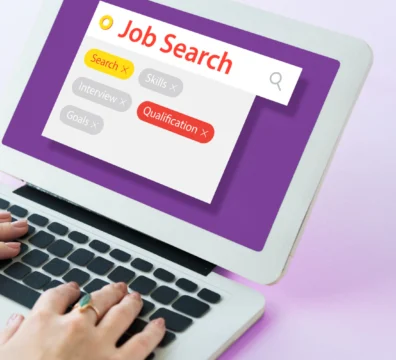Did you know that around 30% of workers fear that AI could replace their jobs within the next three years?
The impact of AI on jobs has been quite visible lately. While it may automate routine tasks, it’s also creating new types of jobs. By 2030, experts predict that AI will create 20-50 million new jobs, especially in sectors like healthcare and pharmaceuticals.
But what about the industries facing job displacement due to AI? Well, while some may see significant changes, the overall economy is expected to benefit from increased employee productivity and output. Still, it’s crucial to understand AI’s impact on employment and the economy as it continues to evolve.
In this blog, we’ll look into the impact of AI on jobs, while exploring the positive impact of artificial intelligence on employment. We’ll also discuss how will AI affect jobs in the future.
Understanding the Impact of AI on Jobs Role
The impact of AI on jobs is profound, especially in industries like high-tech manufacturing. However, this shift is also reshaping job roles. Some roles are becoming obsolete while new ones are emerging.
For instance, in manufacturing, workers now need to adapt to operating and maintaining machines and robots that handle manual tasks. Moreover, the impact of AI on jobs also pave the way for new jobs like data analysts, AI programmers, and machine learning specialists. These roles require a blend of technical expertise and business perception.
Thus, to grow in this evolving landscape, individuals must adapt.
The Impact of Artificial Intelligence on Work Experience
Ever thought about how AI is changing the way we work? Well, AI is revolutionising the workplace in ways we never imagined. From simplifying workflows to personalising learning experiences, the impact of AI on jobs across industries is quite big.
So, let’s look into some of the major impacts of artificial intelligence on work:
Automation
AI is all about making things easier, right? Well, in the workplace, it’s no different. With AI-powered tools, companies can optimise their workflows to run smoother than ever before. These tools analyse operations and pinpoint areas for improvement, helping businesses cut down on manual labour and costly errors.
Plus, predictive models can foresee potential issues before they even happen, saving time and money in the long run.
Personalisation
AI isn’t just about crunching numbers; it’s about understanding people too. That’s why AI-powered tools can tailor learning experiences to each employee’s unique needs.
By analysing data, these tools identify skill gaps and offer customised training, leading to happier, more engaged employees. And let’s not forget about intelligent assistants – they’re like personal productivity experts, automating tasks and providing insights to increase efficiency.
Improved Decision-Making
AI isn’t just smart; it’s lightning-fast too. With real-time data analysis, employees can make informed choices quicker than ever before. Whether it’s spotting trends or forecasting outcomes, AI-powered tools provide valuable insights to guide decision-making.
And for managers, real-time data on employee performance means better-informed decisions across the board.
Enhanced Collaboration
Collaboration is key in any workplace, right? Well, AI is taking teamwork to the next level. With real-time feedback and collaboration tools, employees can work together more efficiently than ever before. Plus, AI-powered resources make it easier to share ideas and tackle projects as a team, no matter where you are in the world.
Improved Work-Life Balance
Last but not least, let’s talk about the impact of AI on jobs work-life balance. We all want to find that perfect balance between work and life, and AI is here to help.
By prioritising tasks and managing schedules, AI-powered tools give employees more control over their time. Whether it’s suggesting the best times for meetings or helping with time management, AI is making it easier for employees to juggle their workload and enjoy some well-deserved downtime.
So, there you have it – the impact of AI on jobs in a nutshell. In the end, one thing’s for sure – AI is here to stay, and it’s changing the workplace as we know it.
How Will AI Affect Jobs in the Future?
The impact of AI on jobs is a hot topic, and understandably so. So, let’s take a closer look at the AI impact on employment, how it shapes the future of work, and what it means for different industries and job roles.
The Reality of Job Displacement
It’s no secret that AI is capable of performing tasks more efficiently than humans, especially those that are repetitive and routine. In fact, according to a report by the World Economic Forum, around 75 million workers could lose their jobs by 2022 due to AI’s incursion into the workforce. This is a significant concern, particularly for workers in fields like data entry, customer service, and basic analysis.
Jobs at Risk
The latest study by OpenAI sheds light on the impact of AI on jobs that are most vulnerable to AI advancements. Roles such as mathematicians, financial advisors, writers, and computer scientists are among those that could see significant changes or even disappear altogether. This highlights the need for workers to adapt and acquire new skills to remain relevant in the evolving job market.
New Opportunities
But it’s not all doom and gloom when we talk about the impact of AI on jobs. Alongside job displacement, AI is also creating new opportunities. The World Economic Forum predicts that around 58 million new jobs will be created in the coming years, many requiring digital skills.
Workers who possess skills like programming and data analysis will be in high demand as organisations seek to use AI for strategic decision-making and innovation.
Impact of AI on Jobs: Tech Profiles in Demand
So, what are these new job opportunities? Let’s take a closer look at the impact of AI on jobs in the future:
- Data Analyst: With data becoming increasingly valuable, organisations need experts to interpret and analyse data to inform business strategies.
- Blockchain Specialist: As blockchain technology gains traction, cybersecurity and fraud prevention professionals will be essential for managing risk in blockchain networks.
- Cloud Engineer: With the shift towards cloud computing, there’s a growing demand for professionals who can build, maintain, and troubleshoot cloud infrastructure.
- AI Specialist: As AI evolves, professionals with expertise in data science, machine learning, and deep learning will be instrumental in developing AI-powered applications and tools to drive organisational growth.
In short, while the impact of AI on jobs may bring about job displacement in some areas, it also presents exciting prospects for new and emerging roles.
How 6 Pence Helps
While the impact of AI on jobs is undeniable, it is not a one-dimensional story of job loss. Instead, AI presents opportunities for job creation, skill enhancement, and industry transformation.
By embracing AI technologies and investing in human capital development, we can shape a future where AI works hand in hand with humans to drive innovation, productivity, and prosperity in the workplace.
If you are looking for workers who are skilled in embracing the changes brought about by AI adoption, then worry not! 6 Pence is here to help you find human resources as per your requirements. We are one of the leading staffing agencies in Bahrain, Oman, Iraq, and Dubai.
To know more, contact us today!
Frequently Asked Questions
1. How does using AI in the workplace impact job satisfaction?
The use of AI at work can affect how satisfied employees feel with their jobs. For instance, AI tools like chatbots can personalise employee experiences, improving job satisfaction. However, too much reliance on AI tools may lead to cognitive overload and difficulty disconnecting from work, which can decrease satisfaction. Therefore, organisations must balance AI use to ensure it enhances job satisfaction rather than detracts from it.
2. What is the negative impact of AI on employment?
The negative AI impact on employment boils down to a few key factors:
- AI’s ability to automate routine tasks can lead to job loss in industries like data entry and customer service.
- Different industries are affected differently, with some experiencing significant job loss while others see growth. This can worsen income inequality.
- AI creates a demand for advanced skills, leaving low-skilled workers at risk of unemployment.
3. What is the impact of artificial intelligence on industry?
The impact of AI on industries is profound and wide-ranging:
- Education benefits from AI with personalised learning experiences and instant assistance.
- Healthcare sees improved diagnostics, robotic surgery assistance, and virtual health monitoring.
- Finance benefits from automation, fraud detection, and predictive analytics for investment.
Overall, AI enhances efficiency, accuracy, and user experiences across various sectors.
Also Read: Is Your Business Ready for the Contingent Workforce Solutions?




































































































